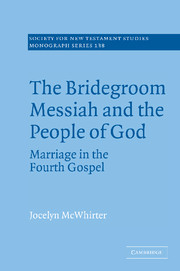Book contents
- Frontmatter
- Contents
- Acknowledgments
- List of abbreviations
- 1 Allusions to biblical texts about marriage
- 2 Echoes of Scripture, representative figures, and messianic exegesis
- 3 The revelation of the bridegroom-Messiah: allusions to Jeremiah 33:10–11 and Genesis 29:1–20
- 4 The glorification of the bridegroom-Messiah: allusions to Song 1:12 and Song 3:1–4
- 5 The bridegroom-Messiah of Psalm 45 in the Song of Songs, Jeremiah 33:10–11, and Genesis 29:1–20
- 6 Hearing the echoes
- 7 Conclusion
- Bibliography
- Scripture index
- Index of ancient commentators
- Index of modern commentators
1 - Allusions to biblical texts about marriage
Published online by Cambridge University Press: 22 September 2009
- Frontmatter
- Contents
- Acknowledgments
- List of abbreviations
- 1 Allusions to biblical texts about marriage
- 2 Echoes of Scripture, representative figures, and messianic exegesis
- 3 The revelation of the bridegroom-Messiah: allusions to Jeremiah 33:10–11 and Genesis 29:1–20
- 4 The glorification of the bridegroom-Messiah: allusions to Song 1:12 and Song 3:1–4
- 5 The bridegroom-Messiah of Psalm 45 in the Song of Songs, Jeremiah 33:10–11, and Genesis 29:1–20
- 6 Hearing the echoes
- 7 Conclusion
- Bibliography
- Scripture index
- Index of ancient commentators
- Index of modern commentators
Summary
“You see that everywhere the mysteries are in agreement,” writes Origen of Alexandria (ca. 185–ca. 253). “You see the patterns of the New and Old Testament to be harmonious.” Origen's belief in the theological unity of the Bible leads him to recognize all kinds of parallels between passages in the New Testament and portions of Israel's Scriptures. Among these are similarities between two of John's stories and certain biblical texts that involve marriage. In his Commentary on John, for example, he compares the Samaritan woman of John 4:4–42 with Rebekah in Gen. 24:1–67. Just as Rebekah meets Abraham's servant at a well, so the Samaritan woman meets Jesus at a well. Origen notes one important difference: whereas Rebekah gives Abraham's servant a drink from her water jar and does not leave it behind (Gen. 24:18), the Samaritan woman accepts the water of eternal life from Jesus and forsakes her own jar – that is, her former opinions (John 4:28). In his Genesis Homily, Origen goes on to extend the connection to two other biblical scenes: the stories of Jacob and Rachel in Gen. 29:1–20 and of Moses and Zipporah in Exod. 2:15–22. He then propounds the unified theological message of the Old and New Testament accounts: “There, one comes to the wells and the waters that brides may be found; and the church is united to Christ in the bath of water.”
Origen also perceives a connection between John's story of the anointing at Bethany and the Song of Songs.
- Type
- Chapter
- Information
- The Bridegroom Messiah and the People of GodMarriage in the Fourth Gospel, pp. 1 - 20Publisher: Cambridge University PressPrint publication year: 2006



